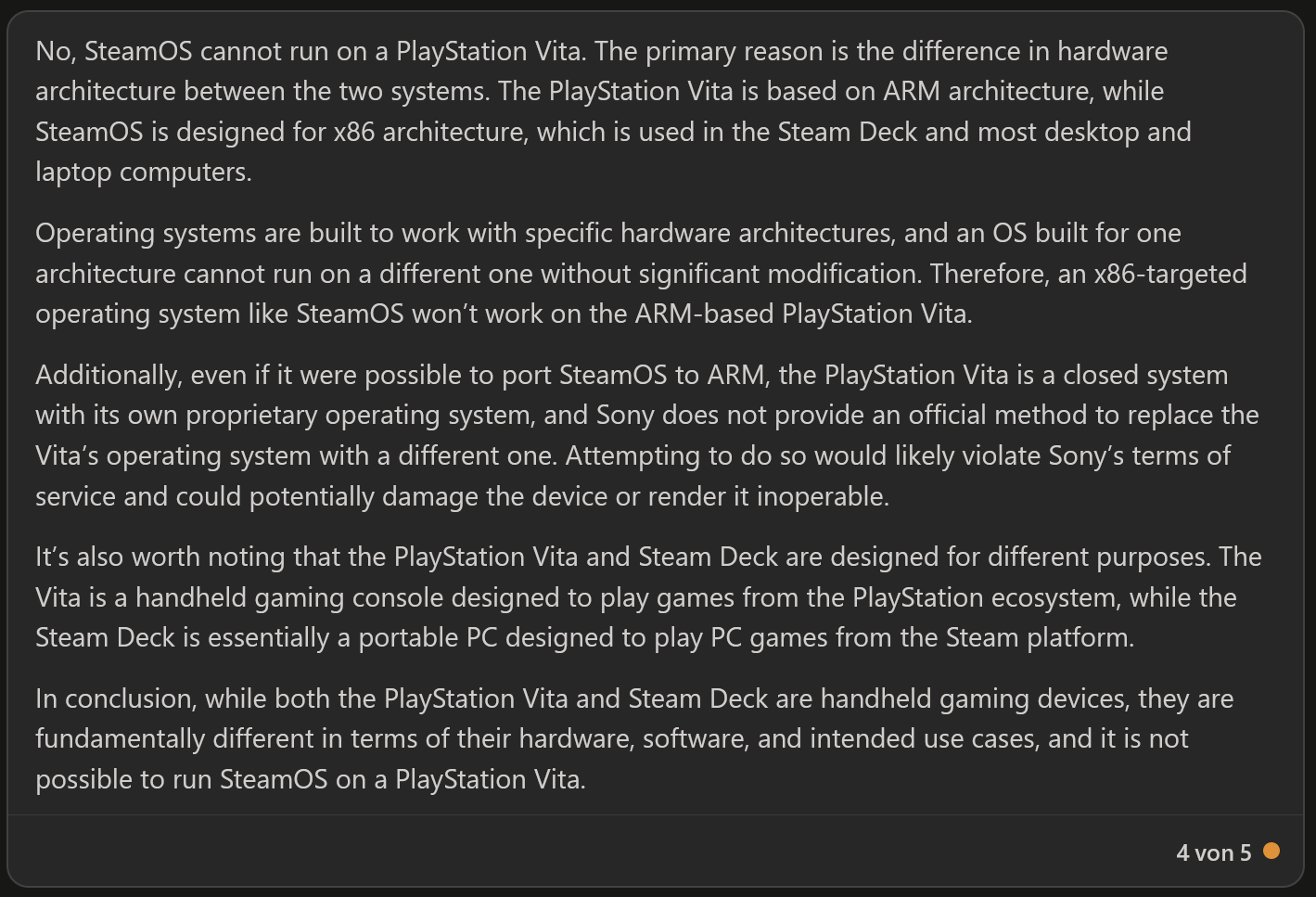- cross-posted to:
- gaming@lemmy.ml
- steamdeck@reddthat.com
- pcgaming@lemmy.ca
- steamdeck
- cross-posted to:
- gaming@lemmy.ml
- steamdeck@reddthat.com
- pcgaming@lemmy.ca
- steamdeck
If Valve really wants gamers to get away from Windows, they need to release SteamOS 3.x.
That’s a big ask to have them release anything with a 3 in it.
SteamOS: GLaDOS then
Followed by SteamOS: Wheatley which appears to be better at first, but then after you interact with a slimmed down GLaDOS running on a potato you come to realize that they will just end up trying to kill you if you give them too much processing power.
Got to keep these bitches thirsty!
It’s just not very general purpose right now. It’s Arch but the base system is set up as an immutable image. Here meaning any changes to the system are lost on updates. This includes stuff like the Nvidia drivers, so it’s my understanding it’s of little use for the majority of Steam’s install base. The kernel also isn’t strictly upstream and last I checked was rather dated with needed bits backported. If your PC however had newer hardware, it could mean you wait very long for support in SteamOS. Also I’m not sure there’s a generic installation process. They probably rather have device-specific images.
PC gamers already have plenty of choice with similar options, even HoloISO which is basically SteamOS with needed bits added. I’m not the biggest fan of SteamOS’ approach for a desktop system, and I’m not sure Valve would want to support this use case.
this is the correct answer
I can’t help but feel like Valve has somewhat dropped the ball by not releasing it yet, at least for other handheld manufacturers to use in their own devices. As it is, the Steam Deck is the only handheld PC that I know of that uses linux, and all the companies jumping on the bandwagon with competition are all using windows. It feels to me like Valve’s attempt at making linux the de facto standard handheld OS for gaming devices has slipped away by now, which is really unfortunate.
Of course, the Steam Deck is still the most popular handheld gaming PC (in large part I’m sure due to low cost and the convenience of SteamOS) so it’s not like it has been a failure at getting more gamers on linux, but I’d guess that if they released SteamOS 3 alongside the Steam Deck it would have made a much bigger dent in the market.
They need to release an actual home console. Not the Steam Machine uncertainty they did a few years ago.
They have the software stack, they need a beefier APU that I’m certain AMD would be glad to provide, a controller based on the Deck, and they’re set.
It could sell in the tens of millions.
Valve is playing the long game, they can only win after the Steam Deck.
Other manufacturers already started to jump on the handheld bandwagon (sadly only windows for now) and once more devices will run SteamOS they don’t even need to release new hardware anymore.
For me the suspend function alone makes the SteamOS superior compared to Windows.
oh my gosh, yes. for example, over the weekend, i brought deck to my parents. was playing Halo Wars before the drive. put deck to sleep (midgame), drove to my parents which takes an hour, hooked up the dock to their TV, turned deck back on, and BAM. playing Halo Wars right where i left off. i leave, and i do the same thing just in reverse. actually, come to think of it, i think im still in the middle of that game… Arbiter is kicking my ass
SteamOS: Alyx will be released before SteamOS 3
That’s very good news! The Steam Deck isn’t available in my country. It’s competitors are, but they lack Linux, which I think makes the Steam Deck special.
wait does this mean I will be able to install it on my PS Vita?!
Steam Deck is too big for my tiny hands!Then get bigger hands.
are you offering yours?
In case this is not a joke, Steam only runs on x86 processors. The Vita has an ARM processor. But I bet someone made some Linux that runs on the Vita. Just not with Steam games.
it’s not a joke, I don’t know shit about processors
it’s not a joke, I don’t know shit about processors
You could use google…
I did, “steam os run on vita” didn’t give me anything. I’m not about to learn all about processors to answer this simple question lol that’s silly
Can SteamOS run on PlayStation Vita and if not why not?
thanks, I still rather ask humans than an AI that doesn’t know how to bake a cake
deleted by creator
Rosetta. But part of the CPU had x86 translation functions built in to help so not as useful here.
Wine and Rosetta are fundamentally different things. Wine is a reimplementation of Windows APIs on Linux, whereas Rosetta is hardware emulation (famously, Wine Is Not an Emulator).
The equivalent of Rosetta on Linux is QEMU, and specifically qemu-user-static.
The thing about hardware emulation, though, is that it has a non-trivial processor overhead. Apple Silicon gets away with it because it’s a very fast chip which has been designed partly with hardware emulation in mind. Trying to emulate x86 on some generic off-the-shelf mobile ARM chip is not going to give great results.












